1 nov 2018

Jerusalem's leather market is one of city's most famous markets that is located in the Old City close to the Church of the Holy Sepulcher. Dating back to the Ottoman era, the market was known for its distinguished craftsmen who primarily worked in leather tanning and manufacturing.
Palestinian researcher Najeh Bkeirat told the PIC reporter that gift and antique shops and restaurants targeting tourist groups now occupy the largest part of the market at the expense of leather shops.
Famous market
Bkeirat called on the Palestinian citizens to visit the leather market regularly to strengthen the steadfastness of Jerusalemite shop owners there.
Hijazi al-Resheq, the head of Jerusalem Merchants Committee, told the PIC reporter that the leather market was one of the largest and most famous markets in Jerusalem.
Al-Resheq said that Jerusalem's leather market was frequented by people from other provinces because of its various goods, especially those related to marriage preparations, such as clothes, dresses, bags, shoes and jewelry.
He added that following the 1967 war, after the evacuation of many Arab neighborhoods in Jerusalem, the market has become almost empty of shoppers.
Commercial collapse
Al-Resheq said that the commercial expansion that happened in Jerusalem over the years limited the purchasing power in the leather market. A few number of merchants remained in their place, while many others were forced to open new shops outside the leather market or outside the Old City.
He said that one-third of the leather market's shops is now closed, adding that a significant shift has been witnessed in the place as many shops were turned into restaurants and cafes.
Al-Resheq noted that the economic situation in Jerusalem markets is completely dependent on foreign tourist groups visiting the Church of the Holy Sepulcher. These groups usually come to Jerusalem with the help of Israeli companies that determine their visit program. Therefore, tourists cannot tour or shop freely in Jerusalem in general and the leather market in particular.
Closed shops
Al-Resheq affirmed that the leather market is only active for two or three months in the year, especially in April when hundreds of Christian pilgrims come to the Church of the Holy Sepulcher to celebrate Easter. However, commercial recession is the case during the rest of the year.
He expressed regret over the increasing number of closed shops in the leather market because of the bad commercial situation and the low purchasing power.
He also stressed that the market needs urgent support and many shops need to be repaired since they have been closed for years. He added that the leather market's merchants have no problem reopening their shops but they are unable to afford the restoration cost.
Palestinian researcher Najeh Bkeirat told the PIC reporter that gift and antique shops and restaurants targeting tourist groups now occupy the largest part of the market at the expense of leather shops.
Famous market
Bkeirat called on the Palestinian citizens to visit the leather market regularly to strengthen the steadfastness of Jerusalemite shop owners there.
Hijazi al-Resheq, the head of Jerusalem Merchants Committee, told the PIC reporter that the leather market was one of the largest and most famous markets in Jerusalem.
Al-Resheq said that Jerusalem's leather market was frequented by people from other provinces because of its various goods, especially those related to marriage preparations, such as clothes, dresses, bags, shoes and jewelry.
He added that following the 1967 war, after the evacuation of many Arab neighborhoods in Jerusalem, the market has become almost empty of shoppers.
Commercial collapse
Al-Resheq said that the commercial expansion that happened in Jerusalem over the years limited the purchasing power in the leather market. A few number of merchants remained in their place, while many others were forced to open new shops outside the leather market or outside the Old City.
He said that one-third of the leather market's shops is now closed, adding that a significant shift has been witnessed in the place as many shops were turned into restaurants and cafes.
Al-Resheq noted that the economic situation in Jerusalem markets is completely dependent on foreign tourist groups visiting the Church of the Holy Sepulcher. These groups usually come to Jerusalem with the help of Israeli companies that determine their visit program. Therefore, tourists cannot tour or shop freely in Jerusalem in general and the leather market in particular.
Closed shops
Al-Resheq affirmed that the leather market is only active for two or three months in the year, especially in April when hundreds of Christian pilgrims come to the Church of the Holy Sepulcher to celebrate Easter. However, commercial recession is the case during the rest of the year.
He expressed regret over the increasing number of closed shops in the leather market because of the bad commercial situation and the low purchasing power.
He also stressed that the market needs urgent support and many shops need to be repaired since they have been closed for years. He added that the leather market's merchants have no problem reopening their shops but they are unable to afford the restoration cost.
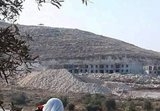
Israeli bulldozers razed lands and uprooted olive trees in Palestinian lands adjacent to the Israeli illegal settlement of Avnei Hefetz, in the northern occupied West Bank district of Tulkarem, on Thursday morning.
The Avnei Hefetz settlement was built on Palestinian-owned lands of the villages and towns of Shufa, Kafr al-Labad and Kafa.
Activist Tahsin Hamed reported, acording to Ma’an, that Israeli bulldozers razed Palestinian-owned lands in the Shufa village of southeastern Tulkarem, in preparation for settlement expansion.
Hamed pointed out that the village is currently wall-to-wall with the settlement, and is continuously facing land-razing for the expansion of the Avnei Hefetz settlement.
Israel’s policy of expanding settlements and outposts has been escalating recently, due to the United States President Donald Trump approving three times more the amount of settlement units than that which was approved in the year and half before his inauguration.
Since the occupation of the West Bank, including East Jerusalem, in 1967, between 500,000 and 600,000 Israelis have moved into Israeli settlements located in occupied Palestinian territory, in violation of international law.
The estimated 196 governments recognized Israeli settlements scattered across the Palestinian territory are all considered illegal under international law.
The Avnei Hefetz settlement was built on Palestinian-owned lands of the villages and towns of Shufa, Kafr al-Labad and Kafa.
Activist Tahsin Hamed reported, acording to Ma’an, that Israeli bulldozers razed Palestinian-owned lands in the Shufa village of southeastern Tulkarem, in preparation for settlement expansion.
Hamed pointed out that the village is currently wall-to-wall with the settlement, and is continuously facing land-razing for the expansion of the Avnei Hefetz settlement.
Israel’s policy of expanding settlements and outposts has been escalating recently, due to the United States President Donald Trump approving three times more the amount of settlement units than that which was approved in the year and half before his inauguration.
Since the occupation of the West Bank, including East Jerusalem, in 1967, between 500,000 and 600,000 Israelis have moved into Israeli settlements located in occupied Palestinian territory, in violation of international law.
The estimated 196 governments recognized Israeli settlements scattered across the Palestinian territory are all considered illegal under international law.
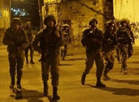
Israeli occupation forces on Thursday destroyed a number of stalls belonging to Palestinian street vendors in al-Khalil.
A PIC news correspondent said Israeli soldiers attacked dozens of Palestinian street merchants and destroyed large quantities of fruits and vegetables exposed south of al-Dhahriya town, in al-Khalil.
Hundreds of vegetables and fruit boxes and vehicles were also smashed by the occupation soldiers.
At the same time, several merchants have been detained for hours at the scene.
A PIC news correspondent said Israeli soldiers attacked dozens of Palestinian street merchants and destroyed large quantities of fruits and vegetables exposed south of al-Dhahriya town, in al-Khalil.
Hundreds of vegetables and fruit boxes and vehicles were also smashed by the occupation soldiers.
At the same time, several merchants have been detained for hours at the scene.
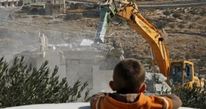
The Israeli occupation forces seized Wednesday night two agricultural tractors in al-Hadeida area in the northern Jordan valley.
Local activist Aref Daraghmeh said that Israeli forces raided al-Hadeida area and seized two tractors belonging to the Palestinian farmers Hamed Daraghmeh and Mufdi Sawafta.
The measure was carried out without prior notices, added the activist.
Israeli forces routinely steal farm equipment and tools from Palestinian lands in an attempt to force them to leave their land tracts. Meanwhile, Israeli settlers are allowed to freely work on seized Palestinian land in those areas.
Local activist Aref Daraghmeh said that Israeli forces raided al-Hadeida area and seized two tractors belonging to the Palestinian farmers Hamed Daraghmeh and Mufdi Sawafta.
The measure was carried out without prior notices, added the activist.
Israeli forces routinely steal farm equipment and tools from Palestinian lands in an attempt to force them to leave their land tracts. Meanwhile, Israeli settlers are allowed to freely work on seized Palestinian land in those areas.
31 oct 2018

Abu Basem stands hopelessly rubbing his hands, as he touches the rest of his olive trees in a valley north of Salfit, looking right and left, and recalling memories when joy was all over his house with the start of the olive harvest, which now turned into tears and pain.
This is the story of farmer Ahmad Eshtayeh, 80 years old from the city of Salfit, who inspects the rest of his olive field north of Salfit behind the apartheid wall, which swallowed 90% of Salfit’s land, leaving too little for him to cultivate.
Killing the joy
Abu Basem says: “We used to get ready for the olive season with joy and happiness, picking fruits while chanting Palestinian folkloric songs, while today we hear songs in Hebrew coming from the settlement of Ariel, which robbed our lands north of Salfit.”
He adds, “The Israeli occupation is killing our joy as we cross the gates of the wall to harvest olives in the fields that lie behind. The settlements stole my land twice; the first was in Wadi Abdul Rahman and the second was in Ezbet Abu al-Basal to build more factories for settlers.”
The journey of torment
Regarding the timing of the olive harvest, he adds that with the Dawn Prayer, farmers prepare themselves to cross the gate which opens from the northern side of the city of Salfit. “I prepared the equipment used in the olive harvest, and offered the Dawn Prayer, and then I went out around 4:30 A.M. and waited until a soldier opened the gate.”
He continued: “The soldier ordered the farmers to show their identities, amid some insults, and then kept our IDs with him, and inspected the equipment we brought along, and then allowed us to enter until 4:00 P.M., threatening those who will be late with punishment.”
“We used to enter and leave our fields whenever we wanted, and we would sleep in our land, and we would care for it whenever we liked,” said Abu Basem. “Now it takes a permit or a humiliating search and a deliberate humiliation to get in and collect the olives, and if one fell and broke his hand, he would have to wait for the gate to open on time,” he continued.
He noted: “Israeli soldiers put us in prison, and they kill the joy of picking up the fruits during the harvest season, where farmers are not allowed to leave even if they had an accident like a snake bite on the grounds that the time of opening the gates is a military order and cannot be changed.”
Researcher Khalid Maali confirms that the olive season behind the wall and near the settlements is very dangerous, and that short periods of olive picking make farmers in constant anxiety and confusion for fear over their olive fields.
He pointed out that the Ministry of Agriculture set the date of 12 October 2018 as the most proper date to harvest olives, but many farmers, especially in the areas near the coast, west of Salfit, Tulkarem and Qalqilya and in lands behind the wall do not adhere to the deadline because of the exceptional situation they live in, as the areas near the coast have a warm atmosphere which makes olives ripen early.
He added that the occupation, by its restrictions on farmers, contribute to reducing the produce due to the lack of care for the land and bulldozing and uprooting olive trees by Israeli forces.
This is the story of farmer Ahmad Eshtayeh, 80 years old from the city of Salfit, who inspects the rest of his olive field north of Salfit behind the apartheid wall, which swallowed 90% of Salfit’s land, leaving too little for him to cultivate.
Killing the joy
Abu Basem says: “We used to get ready for the olive season with joy and happiness, picking fruits while chanting Palestinian folkloric songs, while today we hear songs in Hebrew coming from the settlement of Ariel, which robbed our lands north of Salfit.”
He adds, “The Israeli occupation is killing our joy as we cross the gates of the wall to harvest olives in the fields that lie behind. The settlements stole my land twice; the first was in Wadi Abdul Rahman and the second was in Ezbet Abu al-Basal to build more factories for settlers.”
The journey of torment
Regarding the timing of the olive harvest, he adds that with the Dawn Prayer, farmers prepare themselves to cross the gate which opens from the northern side of the city of Salfit. “I prepared the equipment used in the olive harvest, and offered the Dawn Prayer, and then I went out around 4:30 A.M. and waited until a soldier opened the gate.”
He continued: “The soldier ordered the farmers to show their identities, amid some insults, and then kept our IDs with him, and inspected the equipment we brought along, and then allowed us to enter until 4:00 P.M., threatening those who will be late with punishment.”
“We used to enter and leave our fields whenever we wanted, and we would sleep in our land, and we would care for it whenever we liked,” said Abu Basem. “Now it takes a permit or a humiliating search and a deliberate humiliation to get in and collect the olives, and if one fell and broke his hand, he would have to wait for the gate to open on time,” he continued.
He noted: “Israeli soldiers put us in prison, and they kill the joy of picking up the fruits during the harvest season, where farmers are not allowed to leave even if they had an accident like a snake bite on the grounds that the time of opening the gates is a military order and cannot be changed.”
Researcher Khalid Maali confirms that the olive season behind the wall and near the settlements is very dangerous, and that short periods of olive picking make farmers in constant anxiety and confusion for fear over their olive fields.
He pointed out that the Ministry of Agriculture set the date of 12 October 2018 as the most proper date to harvest olives, but many farmers, especially in the areas near the coast, west of Salfit, Tulkarem and Qalqilya and in lands behind the wall do not adhere to the deadline because of the exceptional situation they live in, as the areas near the coast have a warm atmosphere which makes olives ripen early.
He added that the occupation, by its restrictions on farmers, contribute to reducing the produce due to the lack of care for the land and bulldozing and uprooting olive trees by Israeli forces.
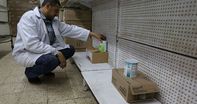
Gaza Ministry of Health on Wednesday warned of the serious drug shortage hitting health facilities in the Gaza Strip and threatening the life of thousands of patients.
Undersecretary of the Ministry of Health Yousef Abu al-Reish, during a meeting with the General Administration of Hospitals and General Administration of Pharmacies at his office in Gaza city, said that Gaza health facilities lack 47% of essential medicines.
Abu al-Reish said that the most important sections, such as the emergency, operation, and intensive care departments, lack the necessary capabilities to keep operating.
The meeting discussed the possible mechanisms to manage the health situation and the crisis plaguing Gaza hospitals, and the policies and protocols that should be pursued toward more rational use of resources.
Undersecretary of the Ministry of Health Yousef Abu al-Reish, during a meeting with the General Administration of Hospitals and General Administration of Pharmacies at his office in Gaza city, said that Gaza health facilities lack 47% of essential medicines.
Abu al-Reish said that the most important sections, such as the emergency, operation, and intensive care departments, lack the necessary capabilities to keep operating.
The meeting discussed the possible mechanisms to manage the health situation and the crisis plaguing Gaza hospitals, and the policies and protocols that should be pursued toward more rational use of resources.

A group of Israeli settlers attacked Palestinian olive-pickers in the Tel Rumeida area of Hebron City, in the southern occupied West Bank, on Tuesday, and attempted to prevent them from picking olives in their lands, adjacent to the illegal Israeli settlement of Ramat Yishai.
The lands belong to local Muhammad Abu Haikal’s family; the land owner, along with local and international activists, entered the land despite Israeli military procedures, according to Ma’an.
Olive-pickers continued despite attacks by Israeli settlers, as they insist on being in their lands and not leaving them unprotected.
An olive-picking campaign was launched by the Youth against Settlement group, in Tel Rumeida, last week, with the participation of international institutions working for peace and justice.
Coordinator of the campaign, Izzat al-Karaki, said, “We are working to support the steadfastness of Palestinian families suffering from attacks by Israeli settlers and army in closed areas of Hebron City.”
Al-Karaki pointed out that dozens of international activist and locals took part in olive-picking.
Agricultural engineer Murad Amr, coordinator of the Youth against Settlement group, said that the campaign continues in high-tension areas of Tel Rumeida and areas adjacent to the Kiryat Arba settlement, in Hebron.
Amr added that his group also formed a night watch committee to guard the olive harvest from being stolen by Israeli settlers.
The area of Tel Rumeida has long been a flashpoint for tensions between Palestinians and Israeli settlers and military, as it is located near illegal Israeli settlements whose residents are notoriously aggressive toward Palestinians.
Tel Rumeida is located within the area of the city designated as H2, an area taking over the bulk of Hebron’s Old City that is under full Israeli military control, and the site of five illegal Israeli settlements which continually expand into surrounding Palestinian neighborhoods.
The Israeli-controlled H2 area is home to 30,000 Palestinians and around 800 Israeli settlers who live under the protection of Israeli forces.
Between 500,000 and 600,000 Israelis live in Jewish-only settlements across occupied East Jerusalem and the West Bank in violation of international law.
The Palestinian government has no jurisdiction over Israelis in the West Bank, and acts carried out by Israeli settlers often occur in the presence of Israeli military forces who rarely act to protect Palestinian residents.
The majority of settler thefts committed against Palestinians are met with impunity, with Israelis rarely facing consequences for such thefts.
Only 1.9 percent of complaints submitted by Palestinians against Israeli settler attacks or theft result in a conviction, while 95.6 percent of investigations of damage to olive trees are closed due to failures of Israeli police, according to the Israeli human rights group Yesh Din.
According to Palestinians and rights groups, Israel’s main goal, both in its policies in Area C, in which more than 60% of Palestinian land is under full Israeli control, and Israel’s illegal settlement enterprise, is to depopulate the land of its Palestinian residents and to replace them with Jewish Israeli communities, in order to manipulate population demographics in all of historic Palestine.
The movement of Israeli settlers taking over Palestinian land, and further displacing the local Palestinian population has been a “stable” Israeli policy since the takeover of the West Bank and Jerusalem in 1967, B’Tselem said, underscoring that all “Israeli legislative, legal, planning, funding, and defense bodies” have played an active role in the dispossession of Palestinians from their lands.
B’Tselem also argued that under the guise of a “temporary military occupation,” Israel has been “using the land as its own: robbing land, exploiting the area’s natural resources for its own benefit and establishing permanent settlements,” estimating that Israel had dispossessed Palestinians from some 200,000 hectares (494,211 acres) of lands in the occupied Palestinian territory over the years.
The lands belong to local Muhammad Abu Haikal’s family; the land owner, along with local and international activists, entered the land despite Israeli military procedures, according to Ma’an.
Olive-pickers continued despite attacks by Israeli settlers, as they insist on being in their lands and not leaving them unprotected.
An olive-picking campaign was launched by the Youth against Settlement group, in Tel Rumeida, last week, with the participation of international institutions working for peace and justice.
Coordinator of the campaign, Izzat al-Karaki, said, “We are working to support the steadfastness of Palestinian families suffering from attacks by Israeli settlers and army in closed areas of Hebron City.”
Al-Karaki pointed out that dozens of international activist and locals took part in olive-picking.
Agricultural engineer Murad Amr, coordinator of the Youth against Settlement group, said that the campaign continues in high-tension areas of Tel Rumeida and areas adjacent to the Kiryat Arba settlement, in Hebron.
Amr added that his group also formed a night watch committee to guard the olive harvest from being stolen by Israeli settlers.
The area of Tel Rumeida has long been a flashpoint for tensions between Palestinians and Israeli settlers and military, as it is located near illegal Israeli settlements whose residents are notoriously aggressive toward Palestinians.
Tel Rumeida is located within the area of the city designated as H2, an area taking over the bulk of Hebron’s Old City that is under full Israeli military control, and the site of five illegal Israeli settlements which continually expand into surrounding Palestinian neighborhoods.
The Israeli-controlled H2 area is home to 30,000 Palestinians and around 800 Israeli settlers who live under the protection of Israeli forces.
Between 500,000 and 600,000 Israelis live in Jewish-only settlements across occupied East Jerusalem and the West Bank in violation of international law.
The Palestinian government has no jurisdiction over Israelis in the West Bank, and acts carried out by Israeli settlers often occur in the presence of Israeli military forces who rarely act to protect Palestinian residents.
The majority of settler thefts committed against Palestinians are met with impunity, with Israelis rarely facing consequences for such thefts.
Only 1.9 percent of complaints submitted by Palestinians against Israeli settler attacks or theft result in a conviction, while 95.6 percent of investigations of damage to olive trees are closed due to failures of Israeli police, according to the Israeli human rights group Yesh Din.
According to Palestinians and rights groups, Israel’s main goal, both in its policies in Area C, in which more than 60% of Palestinian land is under full Israeli control, and Israel’s illegal settlement enterprise, is to depopulate the land of its Palestinian residents and to replace them with Jewish Israeli communities, in order to manipulate population demographics in all of historic Palestine.
The movement of Israeli settlers taking over Palestinian land, and further displacing the local Palestinian population has been a “stable” Israeli policy since the takeover of the West Bank and Jerusalem in 1967, B’Tselem said, underscoring that all “Israeli legislative, legal, planning, funding, and defense bodies” have played an active role in the dispossession of Palestinians from their lands.
B’Tselem also argued that under the guise of a “temporary military occupation,” Israel has been “using the land as its own: robbing land, exploiting the area’s natural resources for its own benefit and establishing permanent settlements,” estimating that Israel had dispossessed Palestinians from some 200,000 hectares (494,211 acres) of lands in the occupied Palestinian territory over the years.
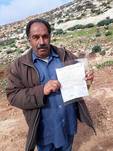
The Israeli occupation authorities on Wednesday decided to expand the fishing area in Gaza sea after it was reduced to 3 nautical miles on 17 October.
Zakaria Baker, who leads Gaza fishermen committees, said that the Israeli authorities informed them of their decision to expand the fishing zone to 9 nautical miles.
Baker said that as of Wednesday afternoon the fishing area stretching from Gaza Valley to Rafah in the south will be expanded to 9 nautical miles, while the area from Gaza Valley to the north will be expanded to 6 miles only.
Gaza fishermen are constantly targeted with shootings, arrests, and fishing bans by the Israeli naval forces.
Zakaria Baker, who leads Gaza fishermen committees, said that the Israeli authorities informed them of their decision to expand the fishing zone to 9 nautical miles.
Baker said that as of Wednesday afternoon the fishing area stretching from Gaza Valley to Rafah in the south will be expanded to 9 nautical miles, while the area from Gaza Valley to the north will be expanded to 6 miles only.
Gaza fishermen are constantly targeted with shootings, arrests, and fishing bans by the Israeli naval forces.
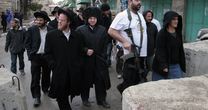
Israeli settlers on Wednesday attacked a Palestinian glass and porcelain shop near the Ibrahimi Mosque in al-Khalil and smashed some of its goods.
The legal unit of the al-Khalil Reconstruction Committee said that the settlers assaulted the shop owner Abdulraouf al-Muhtaseb, and destroyed some of the handmade glass and porcelain goods he sells in the Old City.
Al-Muhtaseb's shop is regularly attacked by Israeli settlers especially for being close to the Ibrahimi Mosque. Settlers have repeatedly offered to buy the shop for millions of dollars but their offers were strongly rejected.
The legal unit of the al-Khalil Reconstruction Committee said that the settlers assaulted the shop owner Abdulraouf al-Muhtaseb, and destroyed some of the handmade glass and porcelain goods he sells in the Old City.
Al-Muhtaseb's shop is regularly attacked by Israeli settlers especially for being close to the Ibrahimi Mosque. Settlers have repeatedly offered to buy the shop for millions of dollars but their offers were strongly rejected.
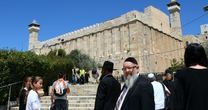
A horde of Jewish settlers on Wednesday morning assaulted several Palestinian citizens and created loud noises at the Ibrahimi Mosque in the Old City of al-Khalil in the occupied West Bank.
Local sources told a reporter for the Palestinian Information Center (PIC) that dozens of settlers placed loudspeakers in the Ibrahimi Mosque’s courtyards and embarked on dancing and singing.
They added that the settlers assaulted citizens living in nearby homes after they complained about the noisy party at the Mosque.
Citizens identified as Ya’qoub Abu Jihad, Khalil Jaber and Ismail al-Rajbi, who suffered bruises after the settlers physically assaulted them, were detained for several hours near the military watchtower in the Mosque.
Settlers also assaulted a storeowner called Abdul-Raouf al-Muhtasib, wreaked havoc on his store and tried to set it on fire.
The settlers later assaulted Abdel Raouf al-Muhtasib, the owner of a commercial shop in the area, and destroyed his shop, tourist artifacts and ceramic goods. Some settlers tried to burn him.
Local sources told a reporter for the Palestinian Information Center (PIC) that dozens of settlers placed loudspeakers in the Ibrahimi Mosque’s courtyards and embarked on dancing and singing.
They added that the settlers assaulted citizens living in nearby homes after they complained about the noisy party at the Mosque.
Citizens identified as Ya’qoub Abu Jihad, Khalil Jaber and Ismail al-Rajbi, who suffered bruises after the settlers physically assaulted them, were detained for several hours near the military watchtower in the Mosque.
Settlers also assaulted a storeowner called Abdul-Raouf al-Muhtasib, wreaked havoc on his store and tried to set it on fire.
The settlers later assaulted Abdel Raouf al-Muhtasib, the owner of a commercial shop in the area, and destroyed his shop, tourist artifacts and ceramic goods. Some settlers tried to burn him.
30 oct 2018
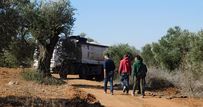
Palestinians living in Qaryout village, south of Nablus, voiced their strong determination to reclaim their lands located in Area B, despite Israeli threats to curb the measure.
Local anti-settlement activist Bashar al-Qaryouti said that the locals have been unwavering about the retrieval of their land lots and have voiced their firm rebuff of any Israeli attempts to hold sway over their lands.
Over recent days, Israeli occupation forces and settlers continue to block works by the Palestinian locals to establish an agricultural road in the area and recover their land tracts.
According to al-Qaryouti, Palestinian farmers have been forced out of the area by the occupation army at gunpoint.
Palestinian farmers also headed for Bteisheh area, west of Qaryout, after they were told that an Israeli guard and settlers have vandalized Palestinian equipment and agricultural facilities in the area.
The activist added that the reclamation project is funded the Première Urgence Internationale in cooperation with the village council of Qaryout and aims to facilitate farmers' access to their lands located in the western and northern part of the town.
The locals said a public park will be established in the village so as to boost Palestinians’ presence in the area.
Local anti-settlement activist Bashar al-Qaryouti said that the locals have been unwavering about the retrieval of their land lots and have voiced their firm rebuff of any Israeli attempts to hold sway over their lands.
Over recent days, Israeli occupation forces and settlers continue to block works by the Palestinian locals to establish an agricultural road in the area and recover their land tracts.
According to al-Qaryouti, Palestinian farmers have been forced out of the area by the occupation army at gunpoint.
Palestinian farmers also headed for Bteisheh area, west of Qaryout, after they were told that an Israeli guard and settlers have vandalized Palestinian equipment and agricultural facilities in the area.
The activist added that the reclamation project is funded the Première Urgence Internationale in cooperation with the village council of Qaryout and aims to facilitate farmers' access to their lands located in the western and northern part of the town.
The locals said a public park will be established in the village so as to boost Palestinians’ presence in the area.
29 oct 2018
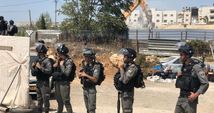
The Israeli occupation forces (IOF) on Monday uprooted 200 olive trees and bulldozed 13 dunums of Palestinian-owned land in Beit Ula town, west of al-Khalil.
Hashem Badarin, who is in charge of the farmers' affairs in al-Khalil, said that the IOF stormed Khirbet Kharouf area, uprooted 200 olive trees planted ten years ago, and destroyed the fence surrounding them.
Hejazi al-Tarshan, the land's owner, said that the Israeli forces have recently stepped up their attacks on Palestinian famers and their lands in preparation for new settlement expansion projects.
The IOF, for the second time, bulldozed 13 dunums of land owned by the Palestinian citizen Mahmoud al-Adam, and removed the barbed wire surrounding a neighboring land owned by Hazem al-Umla.
Hashem Badarin, who is in charge of the farmers' affairs in al-Khalil, said that the IOF stormed Khirbet Kharouf area, uprooted 200 olive trees planted ten years ago, and destroyed the fence surrounding them.
Hejazi al-Tarshan, the land's owner, said that the Israeli forces have recently stepped up their attacks on Palestinian famers and their lands in preparation for new settlement expansion projects.
The IOF, for the second time, bulldozed 13 dunums of land owned by the Palestinian citizen Mahmoud al-Adam, and removed the barbed wire surrounding a neighboring land owned by Hazem al-Umla.
|
|
Dozens of Jewish settlers on Monday morning prevented cargo and tanker trucks from traveling to the Gaza Strip after blocking roads leading to Karam Abu Salem crossing.
According to Israel’s Channel 2, settlers from settlements surrounding Gaza started to rally in the morning in front of the crossing, which is used to transport goods and fuel supplies to Gaza. video Soon later, they embarked on closing off roads leading to the crossing and intercepted trucks. The channel said the settlers were protesting the military tension in southern Israel and the cabinet’s decision not to escalate the situation on the Gaza front. |
Page: 38 - 37 - 36 - 35 - 34 - 33 - 32 - 31 - 30 - 29 - 28 - 27 - 26 - 25 - 24 - 23 - 22 - 21 - 20 - 19 - 18 - 17
